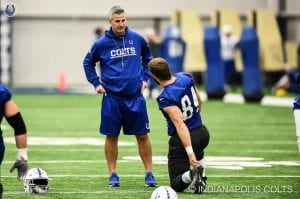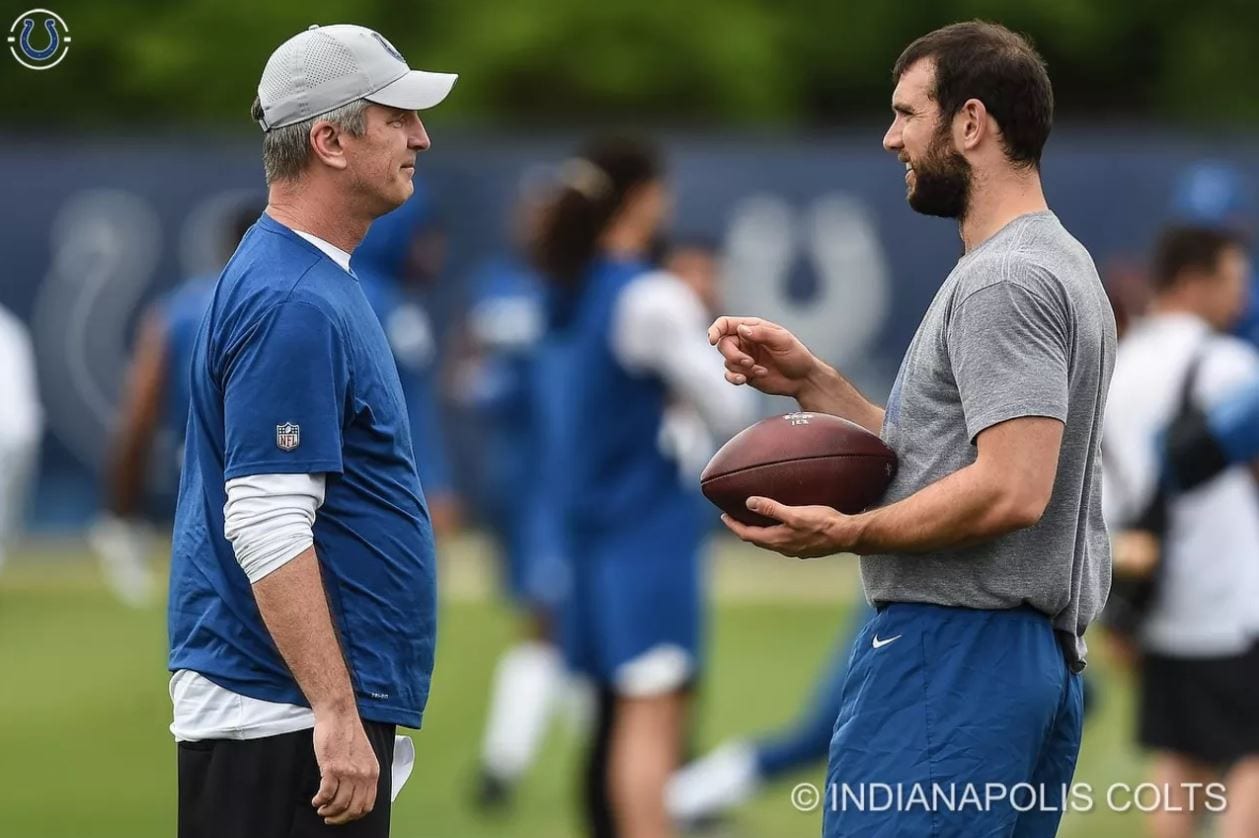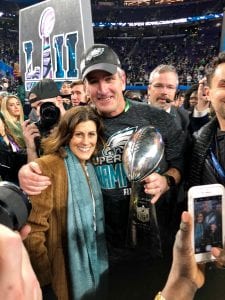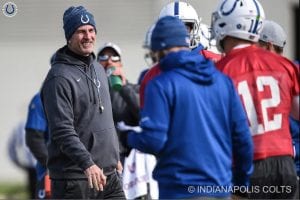***********************
THIS ARTICLE ON FRANK REICH IS A TERRIFIC (LONG) READ, A TESTAMENT TO HOW GOD OPENS, CLOSES AND RE-OPENS OPPORTUNITIES WE COULD NOT FORESEE.
By Sarah Eekhoff Zylstra @ THE GOSPEL COALITION
IMAGINE Southern Baptist Theological Seminary president Al Mohler taking over the Dallas Cowboys. Or Trinity International University president David Dockery coaching the Chicago Bears. Or Covenant Theological Seminary president Mark Dalbey heading up the Los Angeles Rams.
This fall, former Reformed Theological Seminary (RTS) Charlotte campus president Frank Reich began his first season as head coach of the Indianapolis Colts.
“I could never have predicted this path,” Reich told The Washington Post. “It’s crazy. It’s fun.”
It’s not the first time his path has seemed crazy.
When he enrolled in his first RTS class in 1997, he was a backup quarterback for the Carolina Panthers.
“When I was playing, I always thought I was going to be a coach,” Reich told TGC. “When I went into full-time ministry, that was for all the right motives—a real, sincere, heartfelt love for God. I was trying to do the right thing.”
He was “selling everything” to follow Jesus. And he did—he graduated from seminary, led RTS for three years, then pastored a local church. But he didn’t feel called to it.
And RTS had taught him that pastoring isn’t everyone’s calling.
“I came to recognize more and more this false dichotomy between sacred and secular work,” Reich said. He learned about “the priesthood of all believers—that every Christian is called to live out their faith in their sphere of influence.”
And Reich’s sphere of influence is football.
Comeback Kid
The first thing to know about Reich, the Indianapolis Star told readers when he was named head coach in February, is that “he knows about comebacks.”Reich, who grew up in a religious home, has been playing organized football since sixth grade. He went to the University of Maryland on an athletic scholarship, where he was a year behind All-American quarterback Boomer Esiason. He backed up Esiason for three years. When Esiason graduated, Reich finally had his chance to start in 1984.
But one month in, he injured his shoulder. Three weeks later, the coach told him the team would stick with his replacement, and Reich was back on the bench as backup.
Reich couldn’t believe it.
God, I thought you and I were good, he remembers thinking. Why are you doing this to me?
He realized that “football had become my God. . . . When that was taken away from me, I realized I had to reprioritize my life.”
So he worked at it. And a few weeks later, in a game against the Miami Hurricanes, he came off the bench at halftime. The Terrapins were down 31-0.
Over the next two quarters, Reich threw three touchdowns, handed off for two more, and ran one in himself. Maryland won 42–40, and the comeback remained college’s greatest for 22 years.
Football had become my God. . . . When that was taken away from me, I realized I had to reprioritize my life.Almost 10 years later, he did it again, this time coming off the bench in his first NFL playoff game with the Buffalo Bills. Three minutes into the third quarter, the Bills were down 35–3 to the Houston Oilers. Reich handed off for the first touchdown, then threw four in a row. The Bills won 41–38 in a 1993 game that would get its own name (“The Comeback” or “The Choke,” depending on the fan), its own Wikipedia page, and its own NFL record (largest comeback in NFL history).
But Reich’s not a prosperity theologian. He knows getting himself straight with God didn’t lead to touchdowns and paychecks. Four weeks after The Comeback, the Bills lost the Super Bowl 52–17.
They would ultimately lose four Super Bowls in a row, from 1991 to 1994. And Reich never would land that starting quarterback position.

He was flying home from Pasadena when he realized the answer.
“For the first two hours of the trip, I was going crazy trying to figure out why the Super Bowl went the way it did,” he wrote. “Finally, I could take it no longer. I realized I could be asking the same questions the rest of my life. I needed some peace of mind. The only thing I could think to do was to put on my headset and listen to [Michael English’s] ‘In Christ Alone.’”
It was a song his sister had introduced him to. He’d listened to it hundreds of times, even reading it at the press conference after The Comeback.
Now, he “sought comfort from the song which gave me peace during the stressful week prior to the Houston game. The message I was now hearing was that we can experience victory in all our circumstances through Jesus Christ. He gives us the strength and hope to overcome all odds.”
Not Just a Testimony
Reich grew up Catholic, coming to know Jesus as a University of Maryland senior through Campus Crusade for Christ (now Cru) and Athletes in Action.As a ball player, Reich “was very involved in Bible studies and traveling around and sharing the gospel at different events,” he told TGC.
“As I was growing, I felt like I needed some more formalized training to be able to use the platform that sports had provided to be able to share the gospel,” he said. Not only that—“my heart was not just to share my testimony. I also wanted to be able to teach the Bible.”
My heart was not just to share my testimony. I also wanted to be able to teach the Bible.Because Reich was playing for the Panthers, he was living in Charlotte. After “a little bit of research,” the backup quarterback of the Carolina Panthers ended up in a couple RTS classes in the offseason.
(“Of course, I heard about it pretty quickly,” said Ric Cannada, then president of RTS’s new Charlotte campus. Reich even hauled some buddies along with him—the campus still has former Panthers in the classroom.)
Reich kept taking classes during his time with the Panthers, then the New York Jets, then the Detroit Lions. After he played his last pro game in 1998, he took classes while he worked on a few business interests (a sports memorabilia display company and a boot store)
.
“I was in my fifth or sixth year when [Cannada], who had left to become chancellor over the whole system, called me up and said, ‘Can you come into my office?’” Reich said. “So I went into his office and he said, ‘Hey, I’ve been praying about this for a long time. I’d like to ask you to be the next president.’”
Reich laughed.
“You’ve got the wrong guy,” he told Cannada. “I haven’t even graduated yet!”
Natural Leader
As a general practice, RTS doesn’t ask its students to take over operations.But Reich “was an older student when he came,” Cannada explained. “He was mature. He had been reading and studying for 10 years already, and you could see that he was a knowledgeable and serious student in his classes.”
Reich was also “easy and personable, a natural leader.” Early on, Cannada started asking Reich to come along on speaking engagements to share his student testimony.
“We spent a lot of time together in the car, going places and sharing vision,” Cannada said. “I got pretty close to him.”
That closeness ran both ways—on the road, Cannada and Reich “would stop and eat and talk, and I got to learn the inner workings of the seminary,” Reich said.
So when Cannada was elevated to chancellor, and tasked with finding his replacement in Charlotte, Reich was “a natural choice.”
“I’d been with him enough that I knew his character was right, and he could set an example,” Cannada said. “He was comfortable with faculty and students, and his character was strong. And there was vision there—and that’s what you need in a leader.”
Teacher and Coach
Frank didn’t say yes right away. But he respected Cannada enough, and loved RTS enough, to agree to pray about it. Then he went down to Jackson to meet the board. Then he agreed to give it a try for a few years.“It went exceedingly well,” Reich said. “I really did enjoy it.”
The school enjoyed him too.
“During his tenure as president, Frank Reich was known as a man with a vision not only for the growth and well-being of the RTS Charlotte campus, but also for striving to elevate the strategic importance of each faculty and staff member serving with him,” said Rod Culbertson, director of admissions and professor of practical theology under Reich. “He was highly respected for his straightforward communication, integrity, trustworthiness, and humility. Like a coach, he relied upon the insights and advice of others who could help him gain wisdom in decision making.”

Reich’s best leadership was through example, said Kruger, who is now RTS Charlotte’s president.
“Leaders today often underestimate the power of their example,” he said. “They tend to lead by telling people what to do, rather than showing them what to do. Frank was not that way. He would not ask someone to walk a path he was unwilling to walk himself. He sought to embody the values of the seminary, not just talk about those values. That’s been a great lesson for me.”
But at the end of three years, Reich “just didn’t feel like I was called to be an administrator. I’m more of a teacher and coach.”
He knew he was only qualified to teach two things—the Bible and football. He tried his hand at being an interim pastor, but it only took “about a year to figure out that wasn’t the calling on my life. That’s probably the hardest job in the world.”
And his theology told him that preaching isn’t the only work that honors God. “I learned that calling—for most people—is to stay where you are and do your work to the Lord.”
So Reich circled back around to football. “If pastoring isn’t what I’m called to do, and it’s not an accident that God has given me a career in football, then I guess I should make an impact in that arena in whatever way I can,” he figured. “I decided to start coaching at that time.”
45-Year-Old Intern
At 45, Reich took a coaching internship with the Indianapolis Colts. He moved up to offensive coaching staff assistant, to quarterback coach for Peyton Manning, to wide receivers coach. He coached for the Arizona Cardinals for a year, for the San Diego Chargers for three, and for the Philadelphia Eagles for two.
Reich isn’t shy about his faith, but isn’t obnoxious about it either.
“I do think there’s a time to be assertive and proclaim what we believe and stand up on the rooftop and shout it out,” he told Penn Live. “But there’s also a time where we need to keep our mouth shut and just live it out and make someone else ask, ‘Hey, why do act like that? What is it that shapes how you act?'”
“And then when people want to know the why,” Reich told TGC, “you have the opportunity to tell them.”
Reich’s been telling them. Stories of his faith have popped up in news articles: “Reich Answers Higher Calling,” “Philadelphia Eagles Offensive Coordinator Frank Reich Balances Religious Beliefs in Coaching Role,” and, most recently, “Reich, a Man of Deep Faith, Will Need Plenty of It As He Leads the Rebuilding Colts.”
Because when Reich took over the reins in Indianapolis this year, the team was coming off a dismal 4–12 season. Star quarterback Andrew Luck was sidelined with a shoulder injury. The Colts owner was asking fans for patience.
And then the team lost five of its first six games this fall.
Theology of Sports
If you congratulate Reich on being the Comeback Kid, he’ll remind you that he also holds (shares, really) the record for most fumbles in a Super Bowl game.Football is like that. After losing nearly the entire first third of the season, the Colts won nine of the next 10 games to become the third NFL team in history to make the playoffs after a 1-5 start. (“No NFL playoff team came further this season than the Colts,” The Washington Post observed.)
Faith “really keeps you grounded and centered” during the wild emotional swings of professional sports, Reich told TGC. “It gives you perspective. . . . We don’t always understand the ups and downs of life, but we try to stay steady, loving and serving people and being committed to the process of doing things the right way and making an impact that way.”

“I have two little kids, and when I see my children playing a game together I don’t care who wins that game,” Reich told Team NFL magazine in 1993. “I’m their father. What’s important to me is that there’s character being built and they’re learning the lessons that come along with that activity. I think God looks at us the same way. I think the football game is insignificant to him. But what is significant is that we learn what he wants us to learn out of that game, win or lose.”
Reich roots his view of work in Genesis. “Our job description comes from Genesis 1:28—bring out the best in the environment and the people around you.”
As a quarterback, he tried to “be a good teammate, to bring out the best in players around me, to make a good locker room environment, to do my job right.” As a coach, he “works hard, trying to create a culture where people can flourish.”
The ability—and charge—to work well is given to everyone, from seminary presidents to head coaches.
It’s also a lesson that RTS teaches.
“I wasn’t disappointed or bothered by it,” Cannada said of Reich’s decision to leave ministry. “At RTS we very much hold a Reformed worldview, where calling from the Lord can lead us in all kinds of directions. Church ministry is a good one, but it’s not the only one. We’re to serve the Lord wherever we are.”
Current RTS Charlotte president Kruger agrees.
“Frank’s story is a perfect example of what we value here at RTS,” said Kruger (who wouldn’t turn down a job coaching the Liverpool Football Club in the English Premiere League).
“The Reformers taught that all callings matter, not just callings to vocational ministry,” he said. “God’s sovereignty extends to all categories of our life, not just to the ‘religious’ category. And thus God’s Word applies as much to the banker, the farmer, and the athlete as it does to the pastor.”
























No comments:
Post a Comment